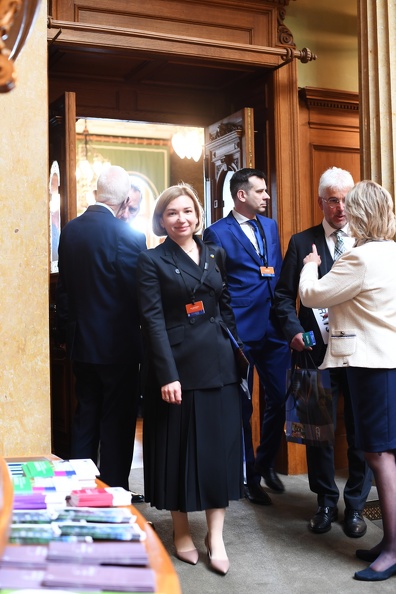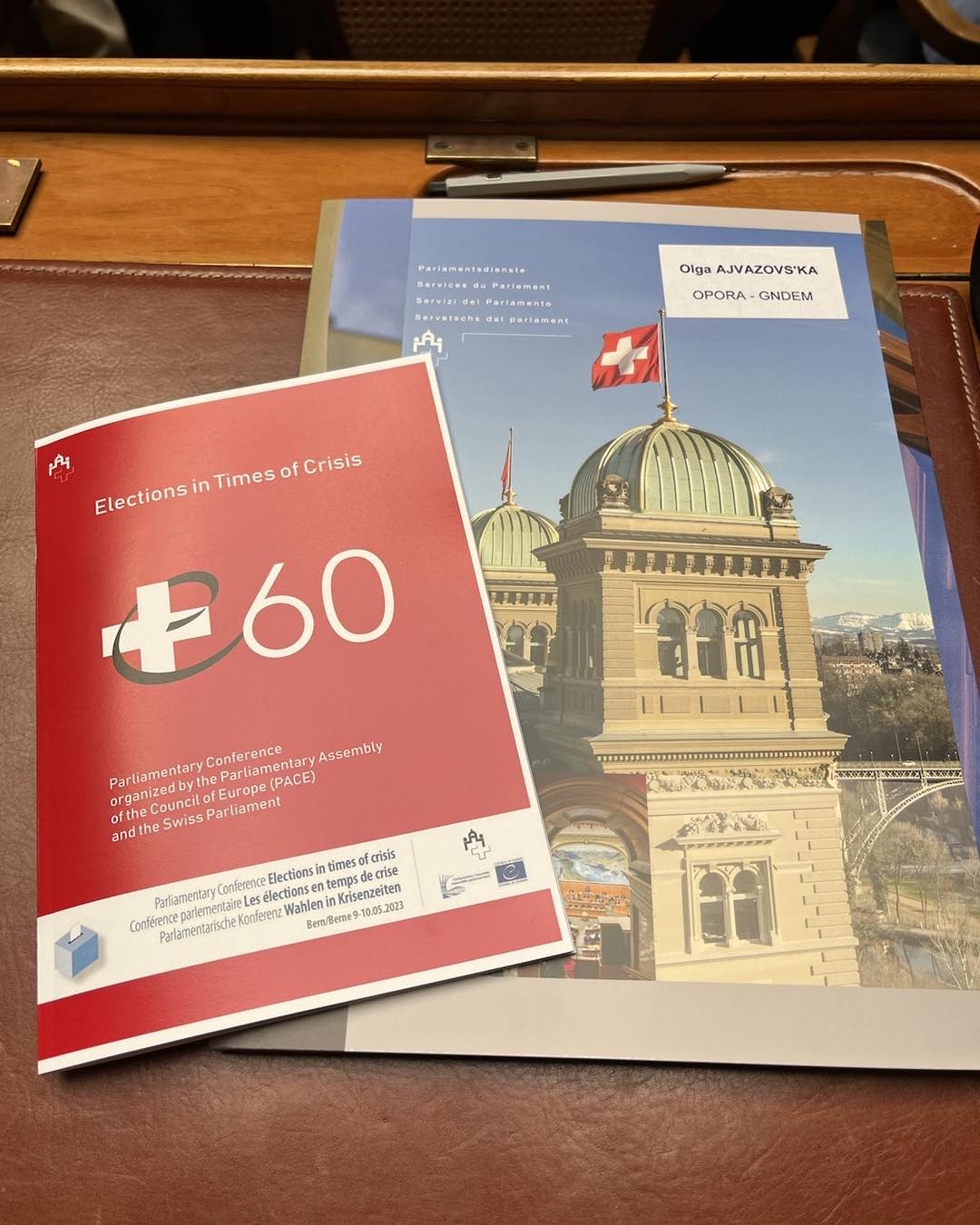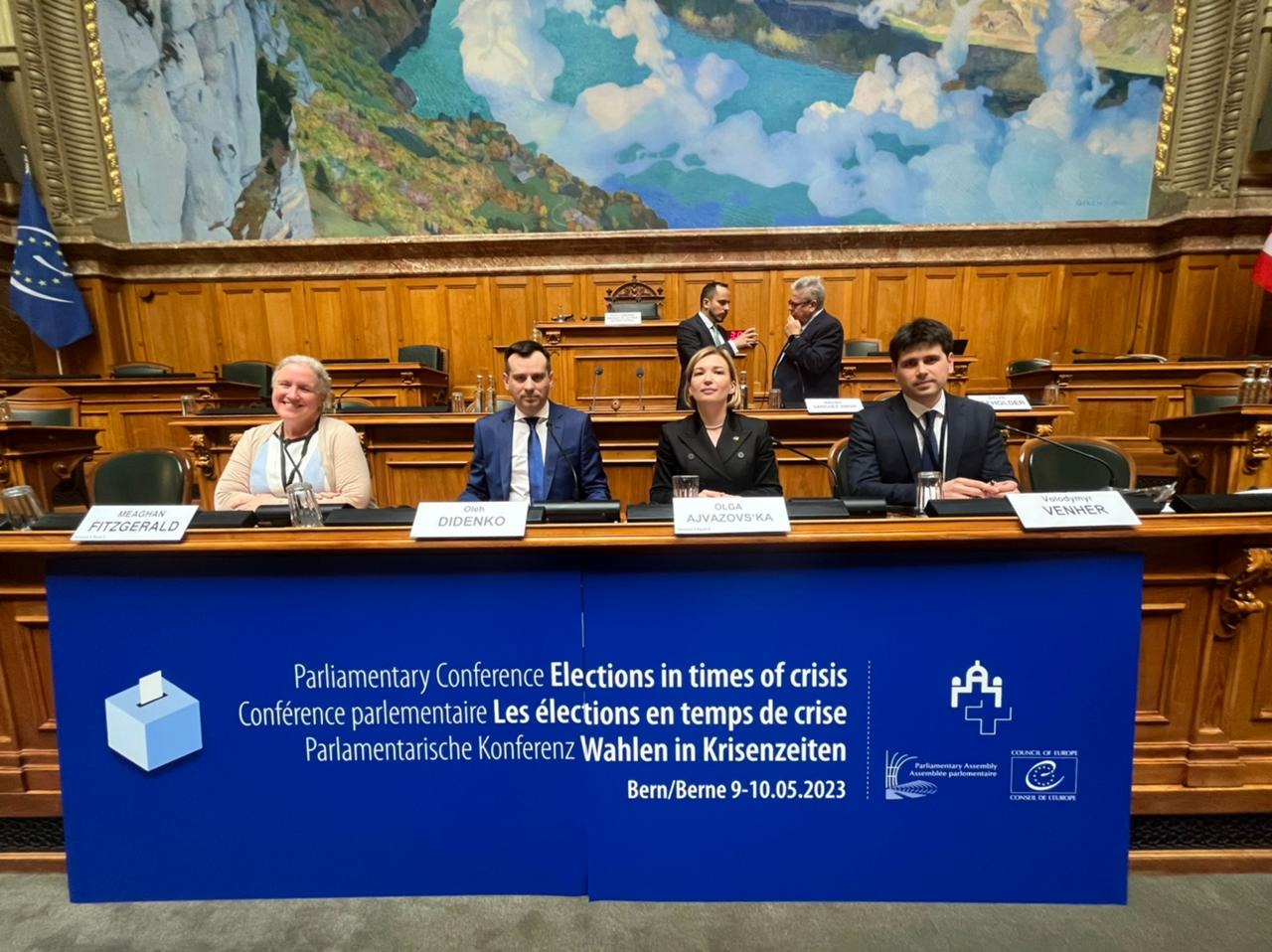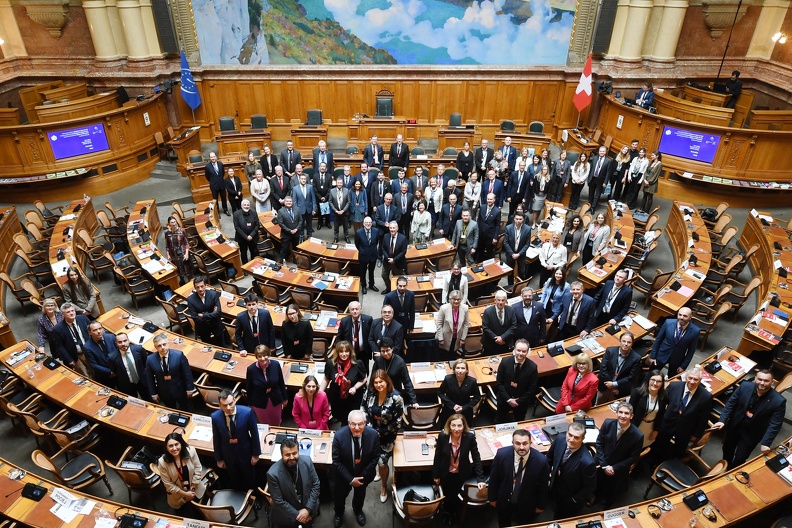The post-war elections will be some of the most expensive efforts in the history of Ukraine because each participant will need to have a full security system in place.
Head of Board of the Civil Network OPORA Olha Aivazovska spoke about this during the panel discussion "Suffrage after the canons fall silent – preparing Ukraine for its post-war elections” within the conference "Elections in times of crisis: challenges and possibilities”. The events was organized by the Parliamentary Assembly of the Council of Europe (PACE) in co-operation with the Swiss Parliament in the framework of the 60th anniversary of the accession of Switzerland to the Council of Europe.
“Free and fair elections are the foundation on which our democracies are built. Yet election organisers face dramatic new pressures – be it from health pandemics such as Covid-19, the return of full-scale war to Europe, or terror attacks and natural disasters. And while technology promises new or more representative ways of voting, it brings dangers too, as powerful new AI and cyber tools expand the scope for pre-poll disinformation and manipulation,” the organizers write on the event’s website.
Elections held amid ongoing armed conflicts are rare as it is nearly impossible to meet international democratic standards in such circumstances. Even in post-conflict situations, many challenges remain. Similar to natural disasters, armed conflicts generate population displacement, both within and outside the country. Security considerations and measures to protect the rights to life, health and security thus need careful balancing against the right to political participation and the integrity of electoral process.



The representatives of Ukraine on the conference spoke about the terms and minimal conditions for calling the national and (early) local elections after the martial law is lifted in terms of security, political environment, logistics, finances. They also discussed guaranteeing the vote of displaced persons within and beyond Ukraine, registration regulations for displaced voters, tackling the risks of election frauds, implementing alternative voting methods; introducing necessary safeguards, influence of social media on the level playing field among candidates, material and technical support for the post-war elections in Ukraine
Full text of Olga Aivazovska’s speech is below.

Ukraine has already had experience in organizing fair and free elections, so lowering election standards in the postwar period could lead to a high degree of degradation of the political system. Losing the democratic progress dynamics is a daunting challenge that can unbalance the social contract and trust that has been formed between the citizens and the state of Ukraine. The war only accelerated the process of forming a political nation. Pathos aside, the expectations of society from post-war reforms and reconstruction in Ukraine are high. A democratic system of governance and the rule of law are an integral part of these expectations.
Experts need to prepare additional conditions for holding postwar elections starting today. Among the key ones:
- The election process, rather than just the voting day, should take place in a controlled environment, and after a preliminary security assessment for all its participants;
- The security assessment system should be based on verified data, clear criteria, and indicators of the state of affairs and include a plan and responsible persons/institutions and a plan to overcome the problem. A mere statement of the fact of danger is not acceptable; instead, each problem should have a program to overcome it, a timeframe, and a budget for the implementation of these important tasks;
- Any decisions on voting procedures and forms need to be balanced in terms of benefits vs risks of application. This also applies to new technologies in the electoral process.
- Even today, election organizers and international partners should realize that the electoral process should maximize citizen engagement in the entire campaign, not just exercising the formal right to vote. Election day is extremely important, as is the method of voting, but without education, information, political debate, free media, and the specifics of the process, data is not meaningful. All internally displaced citizens, refugees, and asylum seekers in other countries should be involved in all stages of the process.
Democracy is expensive, but mistakes are even more costly. The post-war elections will be some of the most expensive efforts in the history of Ukraine, because each participant will need to have a full security system in place.
Participants must be protected. Data must be protected. Information must be protected, at the highest level. Russia will continue attacking Ukraine even after the fighting on the battlefield is over. To some extent, the elections will be a huge test, inside and outside the country.
This is the latest research data that OPORA, with the support of USAID, conducted in 7 countries, such as Germany, the Czech Republic, Spain, the United States, the United Kingdom, Israel, and Hungary. In addition, we conducted and published a survey among Ukrainian people in Poland. The study was conducted with quantitative and qualitative methods, in three stages. In particular, 1,048 respondents were interviewed. 400 citizens of Ukraine additionally filled out diaries on the consumption of news and information. Currently, the stage of in-depth interviews is underway.
15% believe that they can certainly participate in the political life of Ukraine, 28% said they can do it, 37% believe that they rather can not participate, and 9% certainly can not.
As to when Ukraine should hold the first elections after the end of martial law, opinions of respondents differ. In general, 16% believe that elections should take place immediately, 28% suggest waiting 3 to 6 months, and 30% think it should happen in about a year. Another 13% prefer to wait a few years, and 2% have other opinions. The Czech Republic has the highest share of respondents who want an immediate election (21%), while Israel has the lowest share (9%). Respondents in Israel are also the most supportive of the idea of waiting about a year (38%).
36% of respondents believe that the list of candidates for deputies should be the same as in Ukraine, while 22% believe that a separate list of candidates is needed, to represent an out-of-country constituency. A significant part (42%) did not offer the answer.
In terms of countries, the highest support for a single list of candidates for MPs was provided in the UK (45%), and the lowest support was collected in the United States (28%). A separate list of candidates for the foreign constituency is best supported in the Czech Republic and Germany (26% and 24%, respectively), and the least support was expressed in Israel and the UK (16%).
Respondents' awareness of the voting procedure for Ukrainians abroad varies. In general, 24% are well informed, and 21% have heard something about it. At the same time, 46% admitted that they did not know the procedure.
In terms of countries, the lowest level of awareness is observed in Germany (14%).
If they stay in Ukraine, 78% of respondents say that they would definitely take part in the vote. If they stay out of country, this number drops to 60%. In Israel, the most significant drop is in the number of those who will certainly vote if they stay in Ukraine (80%) and if they stay out of country (52%).
As for traditional personal voting, 19% fully trust its results, and 57% rather trust them. Regarding e-voting, 19% fully trust the results, and 49% rather trust. In contrast, for voting by mail, only 8% fully trust the results.
Regarding plans to return to Ukraine, 12% of respondents plan to return in the near future; the most said so in Hungary and Spain (17% each). 20% plan to return but will wait; the highest share in this category stay in the UK (30%) and in the Czech Republic (25%). 35% plan to return after the end of the war; most of them stay in the Czech Republic (41%) and Israel (39%). 17% do not plan to return and will remain where they live; most of them stay in Israel (26%) and the United States (18%).
When asked about the three main reasons that would encourage them to return to Ukraine, the most common responses mentioned security in their region (43%), family reunification (38%), and having a job in Ukraine (38%). Respondents from Israel (52%) and the United States (53%) give more importance to the “home just feels better” reason, compared to other countries.
A diary study of the behavior of citizens abroad took place exclusively on a random sample, which allowed a total of 2,084 questionnaires to be collected.
Most respondents received information about Ukraine from channels and groups in Telegram and Viber messengers (50%), and from social networks of Facebook, Instagram, Tik Tok, and Twitter (47%). Further follow (with a small gap between each other) news websites, Youtube, relatives, acquaintances, and friends (22-23%). The least popular sources are television (8%) and radio (1%). No newspapers or magazines were used by anyone.
Among the respondents who received information about Ukraine from channels in messengers, 89% used Telegram, 6% — Viber, about 0% — WhatsApp. 2% of respondents used other messengers.
Among the respondents, 54% said that on the day before they had come across the information from official authorities, while 44% had not not. Most often, respondents came across information from the Office of the President (61%), the General Staff of the Armed Forces of Ukraine (39%), and from local authorities (17%).
23% of respondents said that the day before they had come across fakes about Ukraine.
